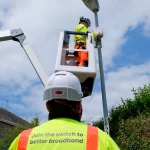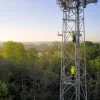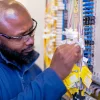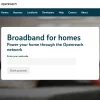Cityfibre Respond as Chancellor Preps Date for Copper Switch Off UPDATE
Cityfibre has claimed that the UK Government’s Chancellor of the Exchequer, Philip Hammond MP, will announce a date for switching off the legacy copper telecoms network in order to encourage investment in Gigabit capable “full fibre” (FTTP/H) broadband ISP networks.
At the time of writing we’ve been unable to fully substantiate Cityfibre’s claim as it came from a third-party remark via the BBC (here), although it does seem highly likely that the forthcoming Future Telecoms Infrastructure Review (potentially due to be published next week) will seek to set such a date. A recent report from the National Infrastructure Commission (NIC) similarly recommended supporting a copper switch-off by 2025 (here).
The idea is nothing new (we’ll come back to that later), although there tends to be some significant confusion around the question of whether or not the copper switch-off proposal will represent a total physical switch-off date or only a partial withdrawal of older services that are carried over copper lines.
Advertisement
Eventually this is bound to happen, particularly with the government aspiring to cover the whole of the United Kingdom with pure fibre optic cables by 2033 (here), although that is currently only a vague aspiration and one that crucially lacks any solid public funding commitments to help the service reach rural communities (we could be talking £20bn+). Cross-party support would be essential in order to protect such a plan from the usual changes of government and spending priorities.
Greg Mesch, CEO of CityFibre, said:
“Switching off the copper network is a vital part of moving the UK to a full fibre future, but leaving decisions on how it is done in the hands of the incumbent risks imposing costs and delays on consumers.
As Clive Selley’s comments on the Today programme make clear, Openreach’s approach to the switchover would result in unnecessary and unwelcome price rises for both consumers and internet service providers.
To put consumers and businesses at the heart of the full fibre upgrade, the Government needs to harness the competitive benefits of new market entrants and set out a carefully managed copper switch off process that prevents Openreach from hijacking the migration process, as this would re-establish its monopoly position and hold back the UK’s digital economy.”
But what does a copper switch-off actually mean and why do it? Openreach have previously indicated that they’d like the ability to migrate customers from copper to FTTP as the network is deployed, which would cut their upkeep costs for the old legacy network and thus turn full fibre into a much more attractive investment. Consumers would obviously benefit from the significantly faster and more reliable broadband.
As usual there are some big obstacles in terms of both regulation and competition. For example, FTTP is a more expensive service and not all customers will be happy about being forced to pay extra for something that they might not want (they’d also require special phone adapters as the new network will use VoIP).
Meanwhile ISPs that have also invested heavily in the copper network (e.g. Sky Broadband, TalkTalk) might lose out and will feel the brunt of any consumer complaints from higher pricing. Openreach’s CEO, Clive Selley, has indicated that completely switching off the old copper network could result in a price rise (wholesale) of roughly £5 a month per line but it’s unclear exactly what this reflects.
Advertisement
On top of that some of those same ISPs are planning to build their own FTTH/P networks (details), which will no doubt take a different approach to service and pricing. All of this could make for quite a confusing set of changes, especially where providers use several different FTTP networks on the same platform. Juggling all this will be a nice headache for Ofcom to balance out.
Openreach have actually already begun consulting UK ISPs on the process and timeline for withdrawing their Wholesale Line Rental (WLR) service by 2025 (here), which underpins a lot of traditional copper telephone lines (PSTN / POTS). But this is not the same as completely switching off the copper network and relates more to a general move toward VoIP adoption.
Naturally those who aren’t reached by FTTP until c.2033 will still need to use that copper network (e.g. FTTC, G.fast broadband), which means that a complete switch-off would be unlikely to happen until after FTTP has reached all corners of the country. Lest we forget the question of Virgin Media’s hybrid fibre coax network, which doesn’t strictly need to be switched-off as it will soon support Gigabit speeds.
A Spokesperson for HM Treasury said:
“The Chancellor has been clear that we must start thinking now about the switchover from copper to fibre to ensure UK infrastructure is fit for the future. We have set ambitious targets for all homes and businesses to be connected to world-leading full fibre broadband by 2033.
We are considering a range of options to make that happen, but have not taken any final decisions.”
The exception to all this might be KCOM in Hull, which dominates the local market and will have achieved almost total FTTP coverage by March 2019. In other words, they have less competition to worry about and may be able to switch off their copper network far sooner than Openreach (here).
Advertisement
UPDATE 18th July 2018
Added a canned statement from HM Treasury above.
Mark is a professional technology writer, IT consultant and computer engineer from Dorset (England), he also founded ISPreview in 1999 and enjoys analysing the latest telecoms and broadband developments. Find me on X (Twitter), Mastodon, Facebook, BlueSky, Threads.net and Linkedin.
« 9,000 Premises in Stepps to Get Virgin Media Broadband Ultrafast
















































Comments are closed